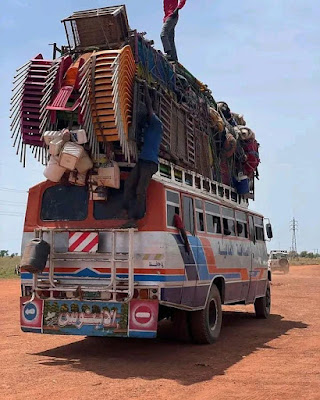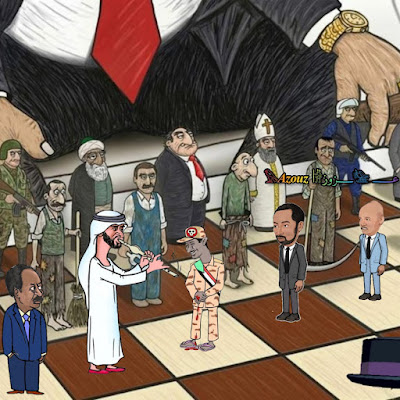NOTE from Sudan Watch Editor: This analysis by Prof Dr Alex de Waal will take me all day to read, re-read, study and digest. As it is important and time is of the essence, I am posting it here now with a view to commenting at a later date. Meanwhile, at the end I've added a post script and two cartoons.
Written by Alex de Waal
Dated Thursday 03 August 2023 - here is a full copy [SW updated 06 Aug 2023, 16:07 BST: added al-Burhan photo and caption]
Sudan’s next stop: Regional proxy war?
Sudan's General Abdel Fattah al-Burhan walks with troops, in an unknown location, in this picture released on May 30, 2023. Sudanese Armed Forces/Handout via REUTERS
Outside powers are taking sides, supplying weapons, and hoping one general or the other will gain the battlefield advantage.
The next stage of the battle for Khartoum will, it seems, be decided in Cairo, Ankara and Abu Dhabi.
The middle powers of the Middle East are talking peace even while they are arming their favored clients.
The theory is that when one side gains a clear battlefield advantage, the other will sue for peace. It’s a high-risk approach.
Egyptian President Abdel Fattah al-Sisi and his Turkish counterpart Recip Tayyip Erdogan are lining up in support of the Sudanese Armed Forces (SAF) and its leader, General Abdel Fattah al-Burhan, who is increasingly backed by the old-guard Islamists who held power under the long reign of President Omar al-Bashir. In doing so, they are setting aside longstanding differences over the Muslim Brothers — Turkey supports them, Egypt suppresses them.
Mohamed bin Zayed al-Nayhan, president of the United Arab Emirates and the ruler of Abu Dhabi, has made the opposite bet. He has supported General Mohamed Hamdan Dagolo, known as Hemedti, the leader of the Rapid Support Forces (RSF) and, according to some reports, is still supplying him with weapons. Hemedti impressed bin Zayed with his energetic leadership, especially of the paramilitaries he provided for the Saudi-Emirati ground war in Yemen, and his opposition to the Muslim Brothers — famously, the Emirati ruler’s bête noire. Hemedti also has a mutually profitable business trading gold to UAE.
Starting a few days after the eruption of civil war in Khartoum in April, the United States and Saudi Arabia convened talks in the Saudi city of Jeddah. The immediate aims were to secure a ceasefire and access for humanitarian aid, but another goal was to prevent the emergence of a proxy conflict such as this.
After a slack period in which two other peace initiatives surfaced — one led by Kenya, the other by Egypt — American and Saudi diplomats have pushed their talks with new vigor. But the chance of a ceasefire is slipping away, and with it comes the peril of a new, even more intense phase of the war.
At the outbreak of hostilities on April 15, Hemedti’s RSF surprised its adversary, the SAF, with its tactical acumen and its ability to hold ground in Khartoum. As RSF troops occupied strategic sites throughout the city, the SAF was reduced to enclaves and to air and artillery barrages. Unable to control the capital, its claim to represent the government was in question.
But the RSF could not press home its early military gains, while it decisively lost any sympathies among the city dwellers through the appalling abuses perpetrated by its fighters—arbitrary killings, rapes and ransacking residential neighborhoods as well as occupying hospitals and terrorizing medical staff, and vandalizing universities and the national museum.
The army interprets the May 11 “Declaration of Principles for the Protection of Civilians,” signed by both parties in Jeddah, as stipulating that the RSF withdraws not just from homes and hospitals, but virtually all the positions it controls in Khartoum. The RSF rejects that.
What it gained on the battlefield, the RSF lost in the political arena. After the popular uprising that overthrew the longstanding military leader, President Omar al-Bashir, in April 2019, Hemedti was the most nimble and energetic politician in Sudan. Belying his horrific human rights record, Hemedti positioned himself as a champion of revolution and the main bulwark against the return of the old guard of the al-Bashir regime. For that reason, segments of the civilian resistance leaned towards him.
Populist politicians thrive in the limelight, but when the fighting broke out, Hemedti disappeared, fueling speculation that he had been seriously injured. Only last week did he release a short video clip. He looked stiff and pallid. Meanwhile, he has forfeited the political initiative.
In Darfur — the RSF’s home base — it and its Arab militia allies have been conducting brutal campaigns of ethnic cleansing, targeting the Masalit people of Western Darfur and the Fur of Central Darfur. There is evidence of mass graves. Militiamen burned the palace of the sultan, customary leader of the Masalit and murdered the ethnic Masalit governor, Khamis Abbakar. The violence compares with the atrocities of twenty years ago, and makes the withdrawal two years ago of the United Nations-African Union Mission in Darfur (UNAMID) look irresponsible.
Whatever happens in Khartoum, Darfur faces another round of turmoil and bloodshed, this time without any serious international attention.
By default, SAF’s leader, General al-Burhan, has gained the political upper hand. He’s increasingly recognized as representing the government. But he has shown neither political profile nor leadership, and it’s unclear if he can manage his cabal of quarrelsome lieutenants, including the resurgent veteran Islamists who served under al-Bashir.
The Forces for Freedom and Change, which spearheaded the 2019 uprising, are trying to regroup, but other civilian groups are disenchanted with them. Most of them refuse to entertain talks with the Islamists—a position that, during the civilian-led interlude that lasted until the October 2021 military coup, pushed the Islamists into the army’s embrace.
Meanwhile, the deposed civilian prime minister, Abdalla Hamdok, has continued his cautious pattern of seeking consensus, disappointing those who wanted to see a more energetic stand against the generals.
The Neighborhood Resistance Committees — which were the backbone of the protests—have repurposed themselves as humanitarian first responders. Depleted by the flight of many members, they have yet to generate a coordinated political strategy.
In June and July, a burst of diplomatic energy seemed to promise that the low-wattage U.S.-Saudi and African Union mediation processes might be overtaken by more vigorous efforts. It hasn’t worked out that way, as rival initiatives have cancelled each other out, turning the diplomatic arena into a field of tactical positioning.
In late June, the northeast African regional bloc, the Intergovernmental Authority on Development (IGAD), held a summit meeting and appointed Kenyan President William Ruto to head a “quartet” including Djibouti, Ethiopia and South Sudan. Ruto made no secret of his strong views. He condemned the war as “senseless” and the violence in Darfur as, possibly, “genocide.” He said that the Sudanese people had made it perfectly clear what they wanted—a democratic government. The IGAD leaders also spoke of activating the East African Standby Brigade to intervene.
Shortly afterwards, Egypt convened a “Summit of Sudan’s Neighboring States.” Strenuous diplomacy by President Abdel Fattah al-Sisi ensured a strong attendance. Paragraph 3 of the communiqué stressed “the importance of preserving the Sudanese State and its institutions, and preventing the fragmentation of the country, or descent into chaos.”
Egypt has a longstanding diplomatic rivalry with IGAD. Twenty-five years ago, the IGAD peace process for southern Sudan, led by a Kenyan general, resulted in a peace agreement that gave the southern Sudanese the opportunity to vote to secede. They took that option in 2011, creating the independent state of South Sudan. A parallel Egyptian-Libyan initiative, resolutely opposed to granting self-determination, was brushed aside.
Al-Sisi’s summit met his minimal aim of blocking IGAD, thus reducing the diplomatic arena to tactical maneuvering without strategic direction.
The Egyptian plan was nurtured behind the scenes by Qatar and Turkey, both of which back Sudan’s Islamists. None are impressed with al-Burhan’s leadership, but they far prefer him to the alternative. This gave al-Burhan the green light to boycott the IGAD leaders’ follow-up meeting, and for SAF to voice strenuous objections to IGAD, on the pretext that Ruto has business dealings with Hemedti and is therefore biased. (They overlooked Ruto’s remarks about genocide, which targeted the RSF and its allies.)
After the Cairo summit, SAF generals have begun talking about how the war may be finished in a few months. Their hope is that Turkey, the region’s leading supplier of state-of-the-art drones—the Bayraktar TB2, deployed to devastating effect by Azerbaijan, Ethiopia and Libya — will provide them with this game-changing technology.
But an escalation in battlefield technology would not go unchallenged. The RSF already has some less capable drones of its own. It will be pressing the UAE to send it high-end versions — and bin Zayed is quite capable of resisting pressure from Riyadh, Cairo and Ankara, and overruling his own advisors to follow his own path. This would turn Sudan into a proxy war among Middle Eastern powers.
With Egypt canceling out IGAD, the diplomatic pass-the-buck goes back to the Americans and Saudis. After a six-week suspension, talks resumed in Jeddah in mid-July. The mediators insist they have a plan and may yet have the leverage to get the generals to agree to a ceasefire. But there’s no sign of a strategic vision for how to help Sudan escape from its crisis.
Written by Alex de Waal
More from Alex de Waal
View original: https://responsiblestatecraft.org/2023/08/03/sudans-next-stop-regional-proxy-war/
[Ends]
____________________
Post script from Sudan Watch Editor
Here are two cartoons. I wrote more but it became a rant about me feeling weary reading never-ending news of men attacking, raping, killing women and children. To help stop the violence I thought of starting a rumour.
The rumour was this. Any man carrying a gun, knife or whatever to attack, kill, rape women and children has a tiny todger. Any man who cares about peace, women and children has a big todger. And any man who cares about peace, women and children and is a real peacemaker has a very big todger.
Job done. Rumour started!
Hemedti is battering the Sudanese nation (independent since 1956), people are burying their dead and plundering the country, while El Burhan remains in his cellar below the Army Command in Khartoum (Cartoon by Omar Dafallah / RD)
Source: Radio Dabanga 28 July 2023 report:
Army delegation in Jeddah returns to Sudan ‘for deliberations’
__________________________
Here is a copy of a tweet by John Godfrey @USAMBSudan 31 July 2023:
"Welcomed the opportunity to visit Egypt to consult with partners on efforts to stop the fighting in Sudan, and to meet in Cairo with a group of Embassy Khartoum locally-engaged staff. Thank you to Egypt for its efforts, including on behalf of Sudanese fleeing the fighting in their country.
9:31 PM · Jul 31, 2023"
Here is a copy of one of the replies, posted in Arabic together with cartoon of chessboard (presumably being played by POTUS Donald Trump):
𓅃𝑨𝒛𝒐𝒖𝒛 𓀛ۦـــۦـزوز𓅋عـۦـــۦــ @oT9KUOpBLUloHHB
حكومتك هي سبب البلاوي اهتموا بامر روسيا والصين أفضل ليكم
Translated from Arabic by Google:
"Your government is the cause of the troubles. Take care of Russia and China. It is better for you."
https://twitter.com/USAMBSudan/status/1686112289726824448
____________________
[Ends]



.jpeg)





